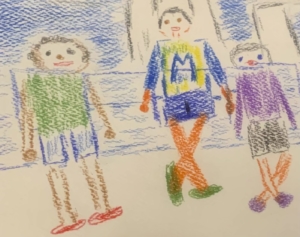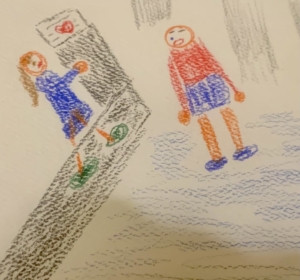Getting stuck on Lamictal is easy. Twenty-four hours in a day, 17 of ‘em spent wishing. That life would be easier, that circumstances would change. On Lamictal, you can’t be the one to change circumstances. Paralysis of action, see? Why not let yourself be fluid and move freely through the world? Like a yoga class where you wear loose-fitting clothes. Who doesn’t like loose-fitting clothes? And why wouldn’t I give that to myself?
The suicidal thoughts had returned as little bursts of self loathing. Didn’t want to die so much as didn’t want to live. Wasn’t about to jump in front of a bus. But if one just happened to careen out of control and tumble in my direction, would I move?
You tell me.
That’s what it’s like on Lamictal. Not from the get-go, over time. Drug’s a thief. Steals action, emotion, ambition, desire. All the things that make a life. One by one the drug plucks ‘em away, like some predator in a horror film. “You won’t be needing this anymore, sweetheart.”
What did I want? Nothing. That’s the point. You stop wanting, you stop livin’. Think about all I missed. Standing in the threshold while outside there were moments to be had. There were moments to be had inside those very walls, had an opportunity been created.
It’s easy to get lost in the vastness of the space between a life well lived and mere existence. The drug sucks you up and spits you out, and all you can do is let it. Such powerlessness isn’t rare, but it’s not common. You find it in prisons, hostage situations, abusive relationships. Days pass into months, months into years. And you’re still there. In the same place, with the same job, in the same life, wanting out. If only you could move.
Can hear Sue’s voice rising in the way she’d argue with a sister if she’d had one. She’s annoyed about something I did, or didn’t do. Can’t get my act together and it looks to the world like I don’t care. It’s not a matter of caring, though. You can care and still not budge. Sue has a hard time watching me, I have a hard time being me.
Feel Chicago as I write this, the comfortable inadequacy that held me back before I knew it could. There’s a stillness that happens when you’ve accepted things too soon. Others were fighting not to feel the stillness, or maybe they didn’t have to. Point is, I wasn’t fighting anything and I should have been. Everyone was making eye contact in a world where I avoided it. Took a while to realize, eye contact is a way of being. Without it, you miss connection.
Some run toward. A greater future, a bold new adventure. I was running from. The discomfort within. Kept pace to the sweeping rhythms of the runner’s trot. Lightweight Adidas upon gravel. The path comes in behind the zoo. Take it up Fullerton to Theater on the Lake, past the rocky outpost, keep going.
To Belmont Harbor, through the shady strip, past the Waveland tennis courts, keep going. Nothing’s better than Montrose Harbor in the evening sun. Time it right, you can catch the sunset over the water and make it home by dark. Sky was always peach by the time I got there, reflecting off the water like glass. The pounding of rubber soles upon gravel let me purge, for a little while, all that I came to forget.


 “What do you call a pig that does karate?”
“What do you call a pig that does karate?”